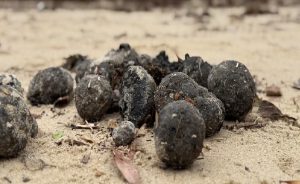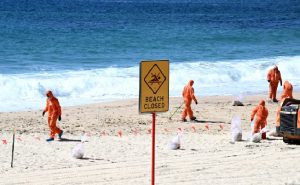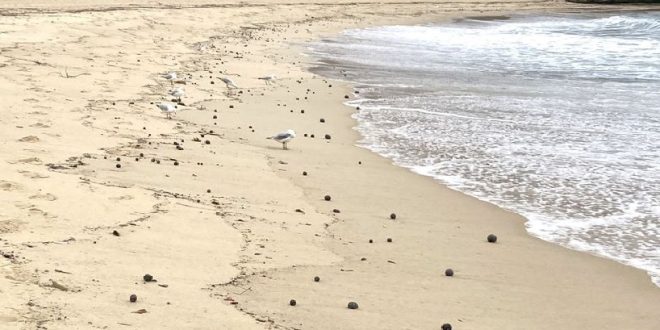20-10-2024
Bureau Report
SYDNEY: Beaches in the Australian city of Sydney have reopened for swimmers after being closed earlier this week when thousands of mysterious black tar-like balls washed ashore, prompting health concerns.
Officials say tests found the balls to be formed from chemicals similar to those in cosmetics and cleaning products but it is still unclear where they came from.
 Eight beaches including Bondi, which is most famous were closed and a massive clean-up ordered amid fears the black deposits were toxic.
Eight beaches including Bondi, which is most famous were closed and a massive clean-up ordered amid fears the black deposits were toxic.
New South Wales’s Environment Minister, Penny Sharpe, said investigations were continuing to establish the source of the pollution and who was responsible.
The state’s maritime authority said the balls were not highly toxic to humans but should not be touched or picked up.
“Based on advice from the Environment Protection Authority, we can now confirm the balls are made up of fatty acids, chemicals consistent with those found in cleaning and cosmetic products, mixed with some fuel oil,” said New South Wales Maritime Executive Director Mark Hutchings.
The New South Wales Environment Protection Authority (EPA) said laboratory testing was continuing, to try to determine where the balls came from, media reports.
“It is still somewhat of a mystery and may take a few more days to determine origin,” said EPA Executive Director Stephen Beaman.
The tar balls were “not harmful when on the ground but should not be touched or picked up”, Hutchings was quoted as saying by Australian broadcaster ABC.
“If you see these balls, report them to a lifeguard. If you or your family accidentally touches one, wash your hands with soap and water or baby oil.”
Sydney beaches that were closed earlier this week when thousands of black balls washed ashore are set to reopen this weekend, with NSW Maritime deeming it safe to do so.
 On Tuesday, hundreds of tar balls which occur when oil combines debris, water and other pollutants washed along Sydney’s coastline, first appearing at Coogee Beach.
On Tuesday, hundreds of tar balls which occur when oil combines debris, water and other pollutants washed along Sydney’s coastline, first appearing at Coogee Beach.
These tar balls have since been confirmed as a mixture of chemicals consistent with those found in cleaning and cosmetic products as well as fuel oil.
Those hundreds of tar balls eventually became thousands, as more washed along over the week, appearing at other beaches including Bondi, Bronte, Tamarama, Little Bay and Maroubra. In response, beaches within Randwick City and Waverley City were closed until investigations and a full clean up were complete but the number of these tar balls have since dwindled, with NSW Maritime reporting only 150 tar balls being discovered on Friday.
“We’ve had teams on the ground, vessels out on the water, and drones in the sky to clear majority of the balls from our beaches,” said NSW Maritime executive director Mark Hutchings.
In response to this reduction, as well as health advice that these tar balls are not highly toxic to humans, NSW Maritime has downgraded the risk associated with these tar balls, recommending that beaches can reopen.
Beaches within Waverley Council were open earlier on Friday.
The five beaches currently closed in the Randwick local government area Coogee, Clovelly, Maroubra, Malabar and Gordons Bay will reopen from Saturday but while beaches are set to reopen ahead of the weekend, the public has been urged to remain vigilant around these spheres.
“They are not harmful when on the ground, but should not be touched or picked up,” Hutchings said.
 Pressmediaofindia
Pressmediaofindia




